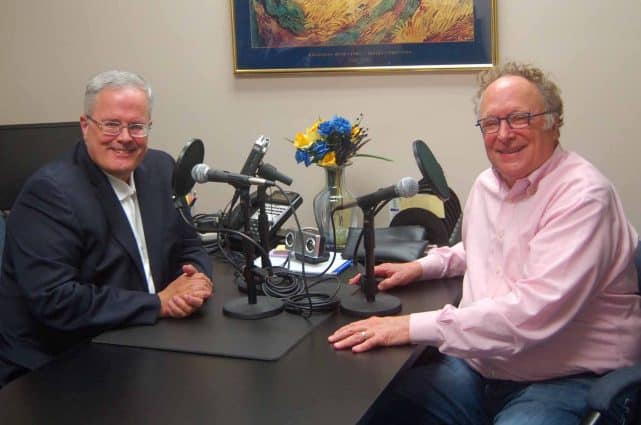This is a transcription of my podcast. As this is a transcript, you’ll have to deal with any grammar, typo or punctuation issues. It’s more like two friends having a discussion. You can click on Google Play if you’d rather listen than read. You can also subscribe to my podcasts on iTunes.
Mark Mitchell: Hello, this is Mark Mitchell from Whizard Strategy, good to have you on this podcast of mine. Today, we’re going to talk about sales, not sales to builders or architects, just overall sales in the building materials area. If you listen to my podcast, you know that I like to have guests on who are specialists, not only experts in their field but specialists in the category of building materials.
And today, I have my co-author from the new book that we’ve written, “How To Be A Sale Building Industry Sales Rainmaker,” Carlos Quintero. Carlos, welcome.
Carlos Quintero: Great to be here, Mark. Thank you for asking me to come.
Mark: Good, when Carlos and I first met several years ago, he’s the first person that I met that really focuses on building materials and has a lot of experience with an impressive client list of helping these companies improve their building material sales. The other thing that really impressed me about Carlos was his approach to how to improve your sales. There are many sales training companies that were all familiar with. They’re easy to find. It’s not that they do a bad job, but they teach you how to sell anything to anybody as opposed to the unique needs of our industry.
So I really like the way that Carlos… the more I got to know Carlos in his approach and how he counsels companies, I really like that and Carlos started out one of the things that appealed to me was Carlos has a quote that he really likes, and it stood out to me because I see so many building material companies think we need to improve our sales, let’s have one, a new marketing program and two, maybe we need to train our salespeople to be better salespeople. And it’s much more; I don’t know if I want to use or say complicated, but it’s much more nuanced than that, and there’s a lot more intelligent way to take an approach. So Carlos, what was that quote again?
Building Materials Sales Excellence is About More Than Training
Carlos: I’ll share with you the quote in a second just as a context is that we find in this that many organizations think that sales are all driven by the salesperson. And while there’s some truth there, a significant truth, that’s why we have salespeople; there are many reasons for success [inaudible]. Success is driven by the product, the product quality, the nature of the product, the appeal of the product. It’s influenced by the pricing strategy, by the competition, and by many factors that influence sales success.
So we always have felt that sales is really a holistic process that requires many people in the organization to be successful and so we also look at it from a sales as a system and Geary Rummler, a gentleman who wrote a book years ago called “Improving Performance” had this quote that’s always, this is the quote that you’re referring to.
Now I’ll read it out loud to listeners. “An organization behaves as a system regardless of whether it is being managed as a system. If you pit a good performer against a bad system, the system will win almost every time. We spend too much of our time fixing people who are not broken and not enough time fixing organization systems that are broken. Over the long haul, strong people cannot compensate for a weak process. All too often, management relies on individual or team heroics to overcome fundamentally flawed processes.” The reason that was such an impactful one for me is because it aligned with the way that we work with our clients.
It’s not about training. It’s about looking at everything you touch when you’re trying to sell to an organization. It’s how everyone in the organization touches the customer and too many times, I was going to many national meetings as you have Mark where the senior executive says, “That Carlos, he stepped up to the plate, he did what it took, he had a 200% year, and they make great laud of Carlos, and he probably deserves it all.” I’m not suggesting anything there, but the truth is how we move the entire organization forward instead of just depending on the man or woman who has a phenomenal year to pull the company out of a tailspin.
Mark: As well in my experience Carlos, if our example of Carlos, if Carlos had a 200% increase with the right system supporting him, he probably could have 400% increase.
Carlos: That’s right.
Mark: So, you raised the bar of the whole sales organization. You take your weakest performers and help them as well as your stars. Everybody, I wished we had a picture here, but Carlos says another great graph where he shows the way you improve is moving the whole graph forward where people make mistakes thinking, “Let’s just hire another star”, and they don’t work on fixing the system.
Carlos: Right, it’s not necessarily about the salesperson. I’ve seen over and over again where great salespeople in one industry shift to another industry or stay within the industry but shift to another product line and they have miserable failures, and it’s not necessarily because of the scale or capability of the salesperson. There is others factor in play and so that’s the reason why I talked about the holistic in the approach that you take.
Mark: The other thing Carlos I’ve noticed is that our sales not to confuse people but our salesperson Carlos that got the 200% increase that there is a real shortage today of qualified people. And there is a real demand for sales stars, particularly in building materials. I get contacted at least once a month saying, “Mark, do you know any sales stars that are working somewhere else” and you are at risk of losing people today if they feel like they are the star within a broken system.
Carlos: Well perhaps so and clearly the top talent always is in demand, but ultimately, the strategy of a senior executive should be how do I help my stars continue to succeed but then how do I help the entire organization raise its overall performance. And so that’s the position that I’ve taken.
Mark: Okay. So, Carlos, I have to admit before meeting you and before you and I writing the book together and the other things that I’ve learned from you, I have to admit that I too was guilty of thinking that look…
Carlos: You, guilty? 🙂
Mark: Thinking of the individual salespeople as what you did was let’s improve individual salespeople, let’s get some sales training, that I fell right into that, and I feel like the majority of the building material companies that I work with see it that way, and I was really amazed. You really opened my eyes when I looked at your holistic approach to improving sales, and I’d like you to share with our audience that approach and the different components of it.
Carlos: Sure. There’re many, many things of course when you’re thinking about the holistic approach that I challenge. Where do you spend your effort? Is it in technology, is it in the process, and is it in reorganizing the sales source? There’re many, many things that you consider. So the challenge always is to pick the right ones. Our experience has been that there’s typically five areas that are essential that an organization needs to consider. So let’s me go through them and feel free to ask questions along the way if you like. The first one is really the most important one, and that is the sales manager. Now, all the research continues to prove that the sales manager is the most important ingredient to sales success. I don’t care how good a salesperson you are. If you don’t have the right leadership of that sales manager, how he/she coaches you, challenges you, engages you, supports you, and encourages you, if you don’t have the right coach and the right sales manager, you’re not going to be a success.
Mark: And I just want to make sure, leadership and managers, that that is not only the vice president of sales, the highest level sales manager but it’s the regional managers, the territory managers, everybody if I understand right, everybody that is supervising somebody.
Carlos: Right and because it starts from the top certainly. Everything we know that there are poor leaders at the top has been champions of whatever strategy because if you’re not practicing yourself as a model, then people will see that at the lower end of the scale.
Mark: Yeah and I maybe stealing some line from the future here but it also seems to me that by doing that effectively, you’re training the salesperson to be qualified to be a territory manager and a territory manager to become a regional manager and one of the regional managers to become the vice president of sales.
Carlos: Sure but that sometimes applies, Mark to the very large companies who have this two or three levels.
Mark: Yes.
Carlos: And many of the people in the building industry don’t have that many levels.
Mark: Yes.
Carlos: They may have… one of your own customers may have 20 salespeople and then maybe only two managers so it doesn’t have to have territory, regional, vice president and so forth levels particularly in this industry but your concept is true. So number one is sales manager is the most important player and it’s critical for an organization to spend effort, time and attention first with excellence in the sales manager role and specifically also have the sales manager get serious about reviewing not only activity certainly but that’s the less important one. It’s how they review results on a monthly basis, how do they review what each salesperson is doing month to month. So, that’s the first one. The second one is sales process. We have found over and over again that, particularly in this industry, probably 85% of the companies have not documented or written down their sales methodology or their sales process.
Mark: Wow, that’s interesting.
Carlos: So if you… and most of them if you join them, they say, “All right, what I need to do boss?” And so boss says, “We’ll participate in some product training so you understand what we sell and then go get them.” It’s a typical experience.
Mark: You’re right.
Carlos: So our challenge to an organization is that how can you improve that which you haven’t defined. So get serious about defining the sales process because if you have a list outlined in broad strokes, not too granular because a review is different but at a high level, if you’re able to highlight the sales process and document it, you are in a much better capacity. So, that’s the second one.
Mark: Yes.
Carlos: The third one is what you are discussing early about training. Training is still important but we choose to call it skills mastery. And the reason that’s important as a term is that get serious about skill, just as the athletes get serious about their athletic ability and practice all week in order to do a ball game at the end of the week, get serious about mastery and define what are the skill areas that your guys and girls have to master and then get serious about practicing it.
Don’t just send to a seminar or get a speaker at the national meeting that’s going to pump them up and then you think that you’re ready to go. Mastery is tough work. It requires repetition. It requires practice. So, the third big category is skills mastery. And so if you’re a listener, are you serious about skills mastery or are you just kind of talk it out loud as something that’s important. So, that’s the third one.
The first one was sales manager, the second one was the sales process, define it and document it, the third is skills mastery, and the fourth and some people say that this is the most important and it is very important, it just depends on the industry but it’s who do you recruit, what’s the caliber of the man or woman that you’re recruiting, and how much time are you putting effort to recruit the right profile.
It’s so expensive to train someone and develop them and get them started and get them going and then eight months later, you figure out that it’s not the person, man you have lost a lot of productivity and you’ve lost a lot of money and so spend the effort upfront trying to narrow your bet in essence because every hire is always a bet and people can do very well in all the testing and all the evaluation and then don’t do well but if you spend a lot more diligence understanding the talent that you’re recruiting, you might be able to make some better decisions.
And finally, the last one that I think is so important is this issue of accountability. Many managers don’t want to have the heart-to-heart conversations with a salesperson. And it doesn’t mean that you have to be a jerk every month trying to have a heart to heart with a sales guy but what it does say is that you’re being hired to produce growth. You’re being hired to generate business for the company who are paying you in most cases a base salary plus commission structure perhaps and so your challenge, what we expect of you is for you to deliver results.
Now, that said, you got to be careful that you’re not pinging on the person every day particularly if they have a long sales cycle but [inaudible] today and how many truckloads that you bring in today but it has to be thought through strategically to simply say what are you doing to advance up to this forward. So the fifth one we’re going to focus is have you done the right things to build accountability in the sales force. Say how?
Mark: Yes, that’s great. Carlos, what this all sounds to me is the analogy of like a professional sports athlete that the professional athlete is constantly, he has…
Carlos: Sharpening the saw.
Mark: He has a great leader that…
Carlos: Approach.
Mark: If he… let’s say he’s a golfer. He probably has a coach who just helps him hut. If it’s a team, they are replaying the last week’s game and so when a big sale is won or lost, to sit down and not just… I hear too often, well the other guy’s price was lower, done as opposed to let’s go back through from the beginning the whole process of how we approached it.
That when you use the word “skills,” I’m thinking of relating it to becoming a better player all the time and so every one of your steps to me I think about whether it’s a professional golfer or a hockey team or football team, the steps they take to really be serious about this. They don’t just take one player or take the player and say here’s the training program for you. It’s a holistic approach.
Carlos: Sales has evolved of course for many centuries and for many, many centuries or for many last hundred years, sales was all about relationship and the personal relationship that you have with someone and relationship is still very important.
In fact if it’s not the most important because people do like to buy from people they know that they can trust. Nevertheless, relationship today is defined differently. There’s a personal relationship that you can have with someone and there’s relationship with trust but then there’s the relationship with everybody else in the company, a relationship with the credit department, a relationship with shipping, a relationship with quality control, a relationship with…
Mark: Customer service.
Carlos: Customer service and so the holistic approach applies there too, that everyone’s responsible for sales and the leaders who really want to build a strong sales culture need to be holistic in their perspective in these areas that we discussed but also looking at the other functions in the organization instead of operating in separate silos that you know is one of the challenges in the industry, how do we have integration and how do we have everyone responsible for the customer experience.
And so, the truth is that that’s the theme that I think is critical and important. We, in sales, love to be left alone. We like autonomy, “Leave me alone, let me go sell, don’t give me more stuff to do.” And I respect that because that’s also one of the reasons I got into sales many years ago. I like the freedom and I like the autonomy. So it’s ultimately the balance between autonomy and science.
So, what’s the art of sales and the science of sales and what we’re observing over and over again is that more and more organizations are getting serious about the science. Today at 4000 people universities and colleges in the United States, there are 33 now that offer sales degrees. We will think as many millions of salespeople are throughout the world there’ll be more universities offering that.
So, the argument is that the sales profession is becoming a little bit more scientific but yet, we always want to guard the importance of autonomy, the importance of flexibility while at the same time, we try to get a little bit of consistency through practice, through mastery, through sales management excellence, sales process and through accountability and if we do those things well, we have a chance to indeed be able to create lift in the sales force.
Mark: Yes, that’s very insightful. Yeah, I noticed that. I always tell my clients that the building materials industry is 10 years behind most than other industries when it comes to marketing but I also think they’re 10 years behind when it comes to sales and while you have shared with me some results that are really impressive with companies that have gone through your program or engaged to, I also look at how for some companies how low the bar is because their competition is doing such a poor job and imagine if you really take a job to me, you set yourself apart in a way that’s hard to compete with.
Carlos: It’s ultimately being at the leading edge and most organizations that we try to work with is we challenge them not to compare themselves to the competitors but rather to compare themselves to what they can be. And sometimes, they should benchmark themselves with people from other industries and necessarily their own industry because maybe the industry is weak in that particular areas.
There’s no one really to kind of stretch the envelope for them but if they now, if you’re in the building industry and you want then to compare yourself to IBM or to a much more sophisticated sales force then do so because they all teach you things that might be not completely relevant to the building industry or the product line that you have but they will certainly give you insights on how to have a better connectedness with your customers and better value that demonstrates your value.
So the salespeople are indeed being seen as advisors and not reps. This industry is very, very still dominant in the word rep. That’s the reps. Yes, they are representatives and they are reps but the truth is you want them to be helpers, you want them to be advisors and you want them to be business professionals that have high business acumen. And so that’s part of the themes that we try to have with our customers and we just think that the building industry has lots and lots of opportunities for building manufacturers to get serious about the rhythm that they can have with sales force.
Mark: Great. Well, Carlos, I’ve really appreciated having you here. Any final thoughts that you’d like to leave our audience with?
Carlos: I think I already pontificated a little bit so I think I’m okay.
Mark: Okay.
Carlos: But indeed if you look at sales as everyone’s responsibility, that the customer’s experience is everyone’s responsibility, well sales taking the lead then you have that mindset as a senior leader particularly if you’re a senior personnel listening to this podcast, think through all the different touch points that everyone in your organization interacts with the customers. So how do we excel in each of those touch points, what is the journey that your customers take and then how can we excel in helping everybody in the organization touch the customer differently? So, thank you for having me.
Mark: Yes, you’re welcome. Carlos, if we’ve piqued anybody’s interest and they’d like to learn more about sales effectiveness, what’s the best way for them to either get in touch with you or find out more.
Carlos: Well, they can reach me at carlos@saleseffectiveness.com. Certainly, our website is www.saleseffectiveness.com and certainly can get our book together from Amazon, of course.
Mark: Of course, you need our book.
Carlos: And they can certainly reach out to me at 770-842-8744.
Mark: Thank you, Carlos.
Carlos: You’re welcome.
Mark: It’s been a great time and I hope once again as always, I hope that our listeners got some value from this and I look forward to you tuning in to my next podcast. Have a great day.
You can also subscribe to my podcasts on iTunes.
Subscribe To My Newsletter
If you like what I say, sign up for my newsletter here and get my weekly newsletter every Sunday night.











